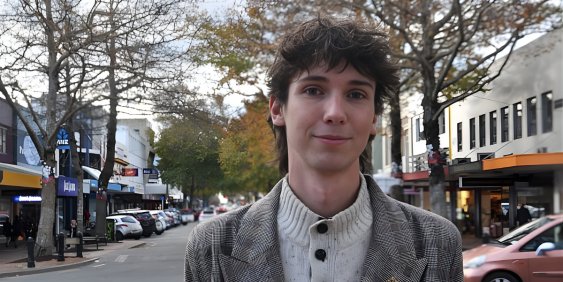Boardroom Premium


Credit: RNZ / Samantha Gee
At 19, he became Nelson’s youngest councillor. Two terms later, he’s reflecting on lessons from the council chamber and the boardroom.
Governance is often invisible. We notice its outcomes, but not the thinking behind them. For Rohan O’Neill-Stevens CMInstD, that’s precisely the point – and the opportunity.
Having stepped down from Nelson City Council, after two terms, the second as deputy mayor, he’s reflecting on the governance journey that entailed.
Elected in 2019 at just 19 years old, he became the city’s youngest-ever councillor and later one of the youngest people to complete the Institute of Directors’ Chartered Member assessment.
“For most people, governance is a forgotten element of our day-to-day lives,” he says. “We see outcomes of governance but not the governance itself.
“I’d done a few things before being elected to council, but it was mostly informal kinds of governance and student stuff.
“Most of it came after being elected. It started with being asked to help with a couple of organisations alongside my council work, and then realising how much opportunity there was in governance – in taking the time to think about the long-term direction those organisations should be heading in.
“It also became really clear there were so many different organisations doing incredible work in Nelson, but many were struggling and needing more strategic understanding and direction.”
By his second term, he was also deepening his own knowledge. “When it came to my second term on council, and having joined a few more boards, I decided it would be a good opportunity to improve the skills I was already applying, so I joined IoD.”
Having found the Company Directors’ Course valuable, he embarked on the Chartered Member programme.
“The Company Directors’ Course was incredible. It was at a hectic time for council mahi, and I found it really useful to step back from the constant day-to-day push of things – to consider both the learning we were working through and to reflect on how that connected to the work I was doing.
“I felt the same with the Chartered Membership process – reflecting on what practice I had been applying and articulating that more explicitly.
“There is a lot of good governance practice that we often take for granted, and having begun a second term on council with a lot of new members, I realised there is real value in being explicit about those good practices.”
O’Neill-Stevens’ roles have included chairing the City Revitalisation and He Tātai Whetū (Arts and Creativity) taskforces, the City Centre Business Forum, and serving as deputy chair of the Infrastructure Committee and the District Licensing Committee.
He co-chaired Local Government New Zealand’s Young Elected Members Committee and was a member of the Local Government Commission’s Governance Education Framework Working Group.
He is chair of the Showquest Charitable Trust, serves on the Tasman Broadcasting Trust, and was a former president of the New Zealand Local Authority Traffic Institute.
He is planning to complete his economics degree, while also pursuing new ventures, and he’s also eager to encourage others to step into governance.
“I have wrestled myself a pipeline of opportunities, but I see so many brilliant people out there who don’t see themselves as having a future in governance – even though they have so much to offer.
“I’ve done a little bit of board recruiting and am passionate about stepping outside the standard circle that typically defines future board members.
“In Nelson, a city of 55,000 people, it’s easy to end up with the same pool of people being discussed every time. I’ve had a bit of experience working with recruiting agencies and, in the Nelson context, a lot of the same people will come out on the final lists.
“I find it’s about being very firm from the outset and having a very clear picture of what the gaps are that you are trying to fill – and which diversity and inclusion practices you want to make seen and felt across that board.”
His view of good governance is rooted in purpose.
“First and foremost, I think a board needs to have clarity of purpose. A healthy boardroom will have a level of disagreement present, but when that is rooted in shared understanding of purpose and future direction, that is when different viewpoints become strengths – helping navigate and make decisions that make the most of the collective knowledge and wisdom around the table.”
O’Neill-Stevens has recently taken on a role as Transition Director, establishing a new development agency for the arts in Nelson, and is looking at where his own governance journey will take him next.
“One reason for change is I want to be actively involved in the ‘doing’ side. The new role is a perfect mix of hands-on, in the thick of things, but also about strategic thinking – how we develop a well-performing organisation.
“I’m in a period of reflecting, asking myself where I can be most effective and useful and, when it comes to the governance side, what are the organisations or arenas of work where I might have something to contribute.

Rohan O'Neill-Stevens CMInstD
“For me, environmental governance and social governance are important facets. I’m not sure we have the best practice possible in this country – especially on commercial boards – in understanding that social licence to operate and having that very clear in governance decisions. That is a passion of mine.”
He’s clear about the stakes.
“Strong, effective governance is so important, especially in a changing world – with climate change and global instability on the rise. Considered strategic thinking is not just critical to the success of organisations now, but for their continued survival into the future.”